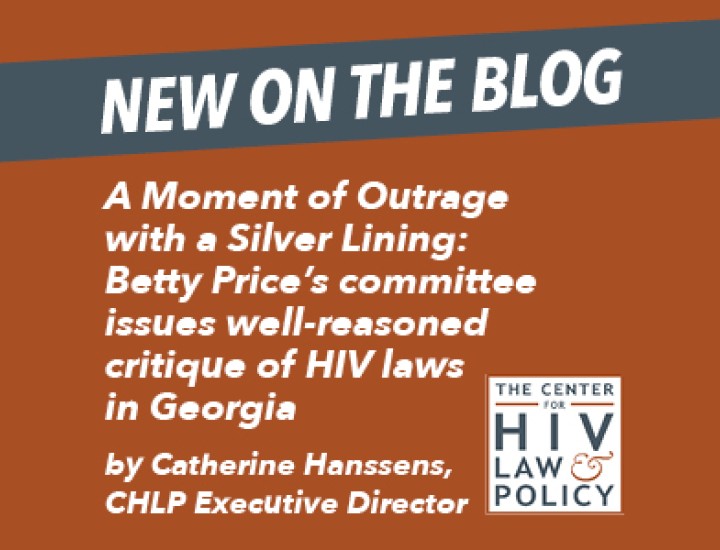Published December, 2017
The Final Report of the Georgia House Study Committee on Georgians’ Barriers to Access to Adequate Health Care (2017)
The Study Committee on Georgians’ Barriers to Access to Adequate Health Care, created by the Georgia House of Representatives, recently released an impressive public policy report calling for significant improvements in access to health care for state residents. Notably, in its conclusions about HIV care and prevention, the report stated: “[c]riminal exposure laws had no effect on detectable HIV prevention” and that these laws should be eliminated except in cases where a separate sex offense such as rape and with an actual risk of transmission is involved, or when evidence clearly demonstrates that the person acted with the intent to transmit HIV and engaged in behavior significantly likely to do so.” The report was based on five meetings and heard testimony from more than 20 experts in the field of public health including from the CDC, medical schools, and departments of public health, from September to November 2017.
Some other noteworthy highlights of the report’s findings on HIV criminalization include:
A remarkably salient and progressive observation about disparities affecting sex workers:
“[C]onsider that both prostitution and solicitation of sodomy are misdemeanors under Georgia law when the accused is not infected with HIV. These crimes only become felonies when the accused merely knows they are infected with HIV and fails to disclose their status. Thus, the current [HIV law] falls short by penalizing behavior that does not require the type of intentional behavior for which an enhanced penalty is typically reserved….”Recognition of the inequity of allowing prosecution of PLHIV under both an HIV criminal law and other sections of the criminal code:
“In Georgia, prosecution of those infected with HIV whose actions fall under [GA’s HIV criminal law] has not been limited to those code sections. In fact, there are documented cases where the state has pursued charges of aggravated assault against an accused in such situations. This inequitable disparity in prosecution of HIV-infected people should be addressed in any reforms made to these laws.”Recognition that Georgia’s HIV criminal law creates additional untenable dangers for survivors of assault:
“[Because Georgia’s HIV law] criminalizes behavior upon mere knowledge of status, there is fear among those living with HIV of prosecution under this statute when they are victims of a sexual assault involving behaviors outlined in this code section. To curb this fear and empower such victims to report these serious assaults, the law should be clarified to account for these scenarios by explicitly exempting such victims from prosecution. “
The report references the CDC and Department of Justice publications as support, and the 2013 Presidential Advisory Council on HIV/AIDS (PACHA) resolution noting the failure of HIV laws “to account for (1) the prevention measures, (2) the reality of disproportionate sentencing that often occurs, and (3) the fact that the laws are based on outdated beliefs about HIV transmission.” In short, the report calls for modernization of Georgia’s HIV criminal laws so that they are consistent with current scientific knowledge, focus more on intent to transmit rather than knowledge of status, and incorporate recognition of risk reduction measures.
Copyright Information: CHLP encourages the broad use and sharing of resources. Please credit CHLP when using these materials or their content. and do not alter, adapt or present as your work without prior permission from CHLP.
Legal Disclaimer: CHLP makes an effort to ensure legal information is correct and current, but the law is regularly changing, and the accuracy of the information provided cannot be guaranteed. The legal information in a given resource may not be applicable to all situations and is not—and should not be relied upon—as a substitute for legal advice.
